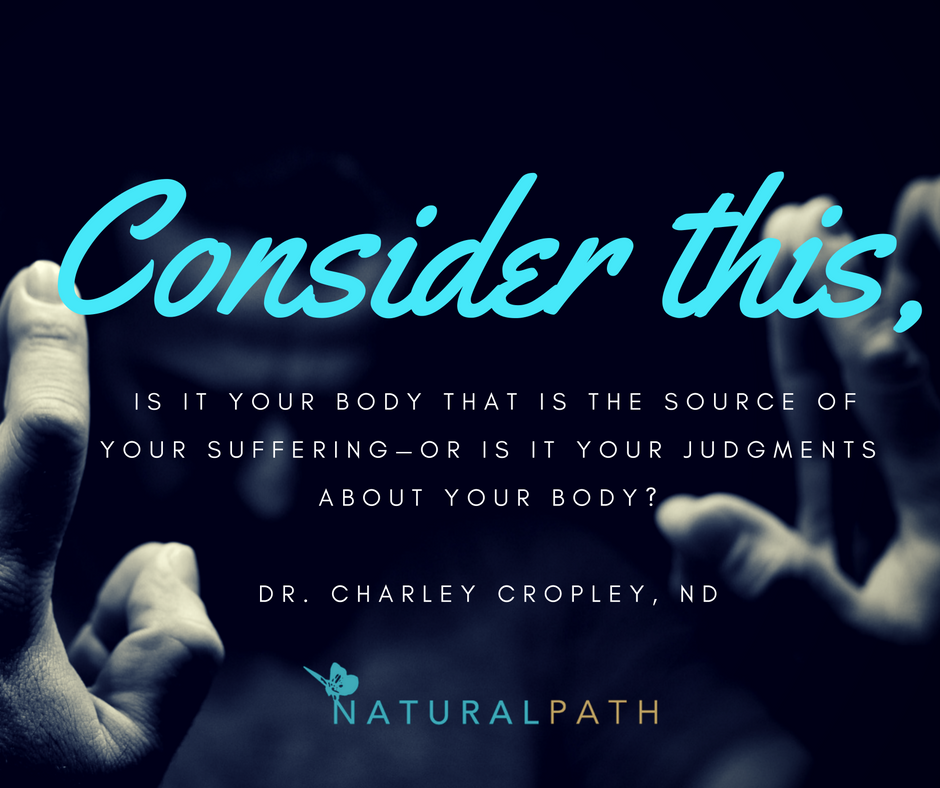Dr. Charley Cropley, ND
@drcropley
Note: this article is primarily for those who want to experience weight loss. It applies but much less to those of you who are ill and genuinely want to be free of your pain or disease symptoms.
article is primarily for those who want to experience weight loss. It applies but much less to those of you who are ill and genuinely want to be free of your pain or disease symptoms.
Martha thinks she is too fat.
She is a beautiful woman, and takes far better care of herself than most people–she trains daily, runs marathons, eats very well, yet she can’t get her thighs, waist, and arms to shed their accumulated fat. She has been through numerous conventional and alternative medical exams and therapies, yet still feels unattractive. As a result, a deep sense of despair has set in, and she doesn’t know what to do.
Under my instruction she has begun daily conversations with her body, seeking to develop a new relationship with it.
After some time I ask her, “Martha, what have you learned in your conversations with your body?”
“Well, it is very difficult for me to express love and gratitude to my body. When I look at my thighs and waist I feel disgusted, sad, and turned off—I can’t pretend that my body is not as it is,” she replies.
“I understand,” I respond. “There is no need to pretend anything, because your body knows the truth—it responds to your true emotional state and what you really think and believe. Your body mirrors you, faithfully reflecting your treatment of her, physically, mentally and emotionally. You cannot fool her.”
“So what am I supposed to do?” she asked.
“First, accept that you have trained your mind to judge.”
“Next, pay attention to how you feel when you ingest those toxic judgments. What happens when you consume thosethoughts—do you feel happy, inspired, and energized? Or do you feel sad, ashamed, weak, and generally lousy?”
Consider this: is it your body that is the source of your suffering—or is it your judgements about your body?
Generating a greater self-awareness around the effects of our negative self-talk is a crucial step to self-healing–most often, we don’t realize that most of our problems exist not in our bodies, but in our thoughts, and the actions that result from those thoughts.
For many of us, our body has become more of a concept than a living being. We want to manipulate it to look like something that we consider beautiful rather than treating it as something beautiful itself.
In truth, we all live in an instrument capable of anything—especially perfect health. Yet we sabotage this extraordinary potential by constantly feeding ourselves with negative thoughts, and have become addicted to unloving thoughts, to criticism, dissatisfaction, sadness, to unhealthy states of dis ease.
And we hold tightly to this self-harm. Which is why it is important question to ask yourself is: why do you want the body you want?
Imagine if you really did have the body you want. How would you feel?
You ultimately want that type of body because you want to feel good about yourself, no? Because you want to experience yourself in a loving and compassionate way. To feel beauty, rather than forcing your body into looking ‘beautiful.’
And yet, how much of your emotional energy do you invest in what you do not like about yourself?
You cannot pretend to love yourself while treating yourself cruelly and unkindly and still expect your body to look as though you really did love yourself.
You cannot talk to yourself this way and somehow expect different results. This is because your body is the arena in which you act out all of your unconscious beliefs, and those beliefs are capable of causing misery on every level.
The good news is that you do not have to hate yourself to get better. You do not have to be miserable.
Hating ugliness is not the same as loving beauty.
It’s helpful to think about the relationship between you and your body in a different way—suppose you were happy with your job and doing the best you could, but your boss focused on only what you did not get done. Not only that, but he would constantly take you to counselors to complain about your performance, and changing the various aspects of your job and areas that you have responsibility for without considering your skills set, or your highest potential. He would constantly give you looks of disgust, and while he was walking away, would mutter under his breath that you weren’t good enough. No matter how hard you tried, you’d never be good enough.
His attitude towards you is not unlike yours toward your body: disappointed, incredulous, unsympathetic, ignoring your strongest attempts to communicate—even your downright rebellion and protest go ignored and suppressed.
The fact of the matter is that your body ain’t broke, and you are trying to fix it.
The question is: can you love yourself as you are? Accept your body as you are?
What kindness is there in your approach? What honoring of the healing capabilities of your body? Of yourself?
You cannot do the ‘right’ things with your body if those things are driven by manipulation, coercion and control and somehow expect to feel as though you were really in touch with your heart, your love, and your desire to heal.
What you appreciate appreciates. Treat yourself with beauty and grace, and your body will reflect that Love.
And as ever, Love starts now.
 Dr. Charley Cropley has been a practicing Naturopathic Doctor, teacher and author in the Boulder/Denver area since 1979. He has trained hundreds of doctors in his methods of nutrition and Self-Healing. He teaches a variety of courses and retreats. He is author of numerous articles, several books, a blog and an array of audio and videos. He is a frequent lecturer at the colleges of Naturopathic Medicine, and is regarded by his peers as one of today’s leading thinkers and teachers in the philosophy and practice of Naturopathic Medicine.
Dr. Charley Cropley has been a practicing Naturopathic Doctor, teacher and author in the Boulder/Denver area since 1979. He has trained hundreds of doctors in his methods of nutrition and Self-Healing. He teaches a variety of courses and retreats. He is author of numerous articles, several books, a blog and an array of audio and videos. He is a frequent lecturer at the colleges of Naturopathic Medicine, and is regarded by his peers as one of today’s leading thinkers and teachers in the philosophy and practice of Naturopathic Medicine.
Charley works with all types of Health problems using no medicines or supplements. He teaches his patients to Heal themselves through wholesome nutrition, strengthening exercise, positive thinking and honest, caring relationships. He lives what he teaches.
















